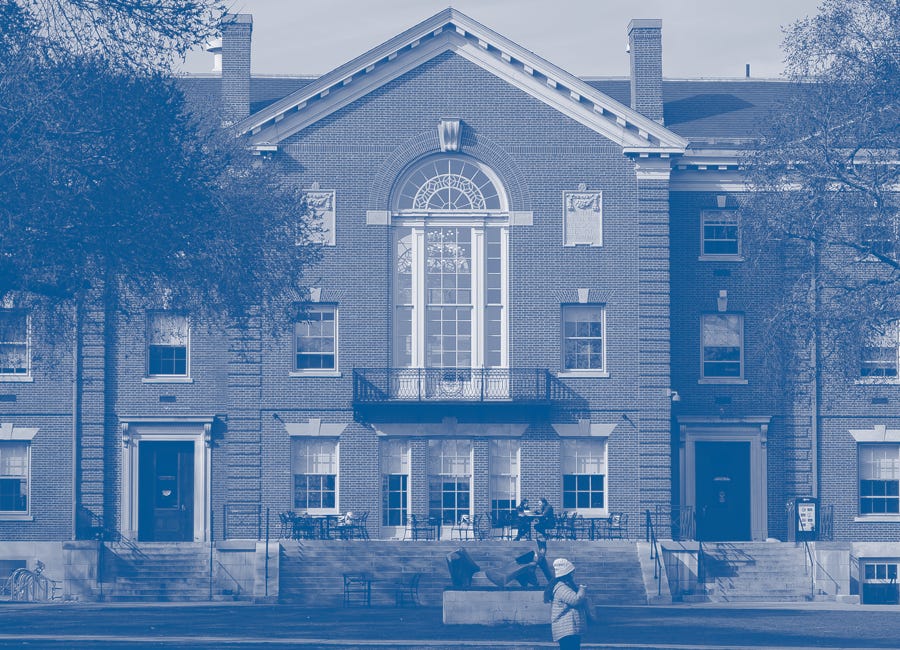Hello and welcome to the November edition of the Berman Archive’s Documensch Newsletter.
In the wake of October 7, public statements have been an abundant and fraught form of discourse. Universities and their leadership have tried to navigate contentious wording and omissions, rarely pleasing anyone. Companies, countless celebrities, Jewish writers, Holocaust scholars, and likely your childhood best friend have all felt compelled to weigh in. Every public statement, it seems, has unleashed a torrent of DMs, group chats, and phone conversations happening behind the scenes. Not to mention an ongoing slate of firings, resignations, and severed ties.
This month we share updates on our recent collections efforts since October 7 and highlight a new partnership with the National Library of Israel. We also take a deep dive on the US campus climate as it relates to Jews historically and the current crisis in Israel and Palestine. We share our latest documentation effort to collect statements from colleges and universities with significant Jewish student populations. If there was any question as to the magnitude of this war and its impact on higher education, the sheer quantity of statements reveal that this moment is affecting and vexing administrators and students alike.
Finally, we take a deeper look at statements and the current “conflict over words” happening here in the US while war rages on in the Gaza Strip. We explore both the current deluge of statements and discourse, and see how statements have intersected with American Jewish communities in the past, as evidenced in the documents in our archive.
As always, reach out with feedback, articles we should consider sharing, or documents we should consider archiving. We can be reached at bermanarchive@stanford.edu.
Thanks for reading,
-Ari
Ari Y Kelman, Director, Berman Archive
History in OUR inbox
Shortly after October 7 we put out the call for people in the American Jewish community to share emailed statements by American organizations—both Jewish and not Jewish—public figures, schools and educational institutions, universities, synagogues, non-profits, and political groups of various types. We’ve been heartened by the response and ask that you keep sending emails our way. In the new year, we’ll be hosting an event about our collections and archival approaches to this material. Our goal is to transparently and collaboratively craft a methodology to ensure these documents can help tell the story of this pivotal global Jewish moment for the foreseeable future.
This month we established a collaboration with the National Library of Israel to combine efforts with archives and researchers documenting Jewish communities around the world in this pivotal moment. Stay tuned for more updates on our October 7-related collection and archive work in the coming months.
Capturing Campus Climates

US College Campuses have always been a place where young people find their political voices, and this world historical moment in the wake of October 7 has instigated much protest, conflict, and incidents of both antisemtism and islamophobia on campuses across the country. In an effort to capture a wide range of Jewish experiences, the Forward produced a sprawling set of articles documenting the experiences and reflections of Jewish students on 11 US college campuses.
The Berman Archive holds documents that provide a historical peek into the US Jewish college experience, too. The oldest we have is this 1924 University of Wisconsin student letter to the Wisconsin Jewish Chronicle on the Jewish experience at the time. Across decades, we have documents that show the evolution of Hillel’s presence on campuses, from 1929 Iowa Hillel Forum, to a 1937 Hillel report on the Jewish Student in America (a key finding was that Jews made up 9% of college student body in America, 3 times their representation in the country broadly), to a 1963 Hillel publication collecting essays exploring the state of Hillel and Jewish education on campus.
The Berman Archive is committed to the ongoing documentation of American Jewish communities in this tumultuous time. Using Hillel’s list of the top US colleges by Jewish population, we have collected all the available University statements relating to October 7 and its aftermath in order to document the campus climate as it relates to, speaks to, or overlooks the Jewish experience of their students and stakeholders.
Take a look and let us know if there are any statements we should add and any observations you’ve gleaned from the ones we’ve shared.
Statement Pieces
In addition to efforts by the Berman Archive and other institutions to capture and catalog the breadth of statements, writers are also starting to analyze this public discourse. Sam Adler-Bell zeroes in on the contours and often frustrating futility of the secondary “conflict over words” in New York Magazine. Jewish Currents looks at the ripples and implications of the 92nd Street Y’s recent cancellation of a talk by Viet Thanh Nguyen because of his signing of a London Review of Books letter calling on the end of violence in Gaza.
Statements and their impact are nothing new. The Berman Archive holds some interesting examples of past statements as they relate to Jews and the American Jewish community more specifically. It’s clear that the conversations happening today around antisemitism and Israel have been going on in America for generations.
Our oldest example comes from 1928 letter from Henry Ford to the American Jewish Committee disavowing and distancing himself from antisemitic statements made in his name at publications he owned. Sounds familiar.
History rhymes again with this 1943 statement of the American Jewish Committee on the withdrawal from the American Jewish Conference. The reasoning for the split centered on the issue of Zionism, Jewish identity, and the formation of the Israeli state:
We affirmed and reaffirm that whatever government be established ultimately in Palestine, there can be no political identification of Jews outside of Palestine with such government. This must be emphasized and we deem it our duty to preserve a position free and untrammelled to urge this view.
Then, as now, the American Jewish community underwent a large degree of soul searching as Jews wrestled with their identities and affiliations with nations in the wake of global tragedy and trauma.
We also hold a compelling 1944 Zionist Organization of America pamphlet compiling 8 political statements in support of the Zionist cause. The final statement, placed in the NY Post and the New Republic in March of 1944 asks the following:
Of President Roosevelt we respectfully ask to make unmistakably clear his position on the Palestine question, since no member of his Cabinet would embark on anti-Zionist activities against the President’s expressed will. And of Congress we ask to pass the Palestine resolution; to reaffirm that the United States will ever remain faithful to the principles of justice and humanity; that no outside interference and threats can influence the democratic processes of our great nation; that America’s name will never be dishonored.
Men and Women of America! A people in despair cries out to you for justice! Will you let them die, or will you lend a hand to save them?
This language, calling for “justice” and “humanity,” echoes the cacophony of statements and pleas heard today in the wake of the formation of the Israeli state and as war rages in the Gaza strip. This statement shows how malleable these phrases are when directed towards a nation that has always had an uneven relationship to “justice” and “humanity.”
